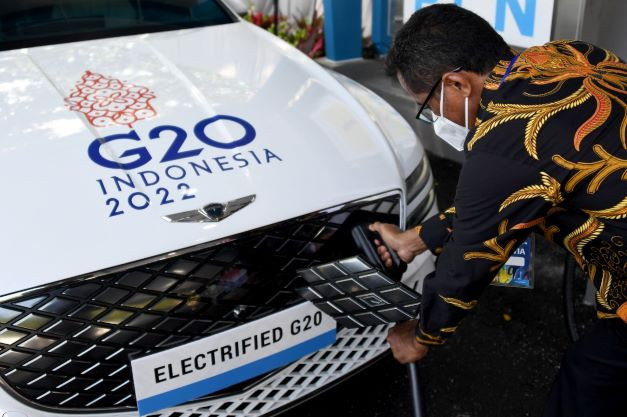Popular Reads
Top Results
Can't find what you're looking for?
View all search resultsPopular Reads
Top Results
Can't find what you're looking for?
View all search resultsDriving EV uptake
Disincentivizing the use of petrol vehicles through the gradual, yet steady phaseout of fuel subsidies is crucial to support overall market development and promote the growth of EVs.
Change text size
Gift Premium Articles
to Anyone
T
he Indonesian government has exempted electric vehicles (EVs), battery EVs and plug-in hybrid EVs from sales and luxury sales taxes, plans to subsidize EV purchases and has successfully wooed in EV manufacturing behemoths from South Korea, China and Japan to set up manufacturing plants in the country.
But the fiscal measures and the supportive investment climate are not enough to help the country meet its ambitious target of having 2.5 million electric car and e-motorbike users by 2025 and making the country a global manufacturing powerhouse for EVs and car batteries. The car industry association (Gaikindo) has estimated domestic EV sales would reach only 25,000 in 2030 from 1,285 in 2021.
We fully support the government policy of developing EV and car battery production by leveraging the core advantages of the country’s large nickel resources to provide basic materials for the industry, and EVs are an important component of Indonesia’s low-carbon energy transition, reducing the nation’s dependency on oil imports and help improve fiscal position and socioeconomic development.
But additional measures are necessary to create an overall supportive ecosystem to further drive down upfront costs, to improve the convenience and functionality of EV in order to encourage nationwide adoption. The lowest price of an e-car now is still twice the price of most internal combustion engine cars. Major buyers at present are still limited to big companies and institutions with financial resources and long-term sustainability strategies.
Put another way, the right ecosystem for consumer buy-in, policy support and infrastructure build-up should be established. Disincentivizing the use of vehicles running on gasoline through the gradual, yet steady phaseout of fuel subsidies is crucial to support overall market development and promote the growth of EVs. Tightening vehicle emission standards, fuel excise duty or economy-wide carbon prices would discourage consumers’ preference for fuel-powered vehicles.
The types of EVs that are adopted will also influence the country’s ambition to become a dominant regional – and even global – EV and battery player. There are three main types of EVs, using different combinations of energy sources – hybrid electric vehicles, plug-in hybrids and full electric vehicles (using a battery).
Motorbike and car making is the kinds of manufacturing industry that require high economies of scale to support mass production to make EVs more cost-competitive with fuel-powered vehicles. Until full EVs reach a point of mass adoption, hybrids and e-motorbikes will likely lead Indonesia’s EV markets for the next few years. The popularity of hybrids is not surprising in view of their ability to combine electricity and fuel combustion to eliminate reliance on limited infrastructure such as charging stations.
All in all, EV uptake is closely coupled with Indonesia’s economic development and energy sector strategy, the capacity of the state-owned electricity enterprise, to build extensive networks of charging stations through its electricity network. Further enhancing the use of e-buses, hybrids and e-motorbikes, which has been rising steadily could become an initial confidence-building step for familiarizing consumers with EVs and their great contribution to cutting air pollution.











